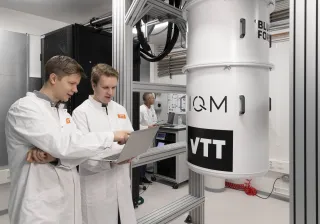Most workplaces are struggling with reduced engagement and job satisfaction as a result of the pandemic, the Great Resignation, and the intense competition over talent. Many employers look for answers in higher rewardings, flexible remote work policies, or other perks. Meanwhile, VTT has seen dramatic results in the organisation’s emotional climate in just a year.
VTT Technical Research Centre of Finland conducted an experiment to train 200 of the company’s top leaders in emotional agency. The experiment began in spring 2021 and, already, 12 out of 14 different psychological markers have improved significantly in just over a year. The results are based on a survey of 850 employees of the 2,100-strong organisation.
According to the results, emotional agency has strengthened and emotional skills have improved on both personal and organisational level at VTT. Psychological safety, emotional skills of the workplace and positive organisational practices have improved compared to the starting point in spring 2021.
Emotional agency is the awareness, understanding and consideration of emotions in activities, interactions and organisational practices. It is not a personality trait but a skill that can be developed. It is also being researched at Finnish universities.
“Groundbreaking innovation requires psychological safety. You cannot innovate if you feel like you are not allowed to fail. VTT’s scientists set out to solve the greatest challenges our planet faces every single day – from combating climate change with carbon neutral solutions to developing new sustainable products and materials. With this level of ambition, our employees need a safe environment to try and learn. For us, emotional agency means being able to stay true to our purpose,” says Kirsi Nuotto, SVP of Human Resources at VTT Technical Research Centre of Finland.
With the combined expertise of some of the world’s brightest scientists and researchers, VTT has developed technologies to, for example, revolutionise plastic recycling, use cellular agriculture to produce lab-grown coffee, and create egg white – without any chickens. VTT also operates Finland’s first quantum computer.
The experiment has also shown other tangible results during the project: sick leave days have decreased by 25%. Within VTT’s people engagement survey, the most dramatic improvement can be seen in the satisfaction in leadership, performance and wellbeing with VTT, all rising to an excellent level.
“We want our employees to feel able to express both positive and negative emotions. The top three positive emotions in our survey were interest and curiosity, hopefulness, optimism and trust, and excitement and inspiration. For innovation and discovery, these are crucial emotions. The most common negative emotion is stress, but the frequency of the emotion has decreased from 2021,” elaborates Nuotto.
Broaching the topic of emotional skills, however, is not always a given in a science-driven organisation.
“Of course, we initially had our doubts. To put it bluntly, emotional intelligence is often considered a soft skill with no direct connection to reaching business goals. We also wondered whether we’d be able to find the time to dedicate to the numerous workshops and exercises the experiment required,” adds Nuotto.
To continue the successful experiment, it has now been expanded to include all of VTT’s 2,100 employees to continue building an emotional climate that supports VTT's strategy and culture of ambition.
“This experiment is part of our long-term strategic program, New Work, aimed at building the world’s most meaningful workplace. We’ve conducted several other experiments as well to create the workplace of the future and, so far, the results and feedback have been very positive,” says Marketing and Communications Vice President Jenni Santalo, leading the New Work programme.
Additional information about the experiment:
- To develop emotional agency, VTT decided to take part in an R&D programme run by Emergy, a Nordic leadership training and coaching company. The program is a joint project between Emergy and two Finnish universities. Alongside VTT, two other organisations are included in the research. The experiment involved 200 leaders of VTT, each one participating in six workshops, 5 case clinics, peer-mentoring and real-life exercises.
- Emotional agency was practised and strengthened by recognising the emotions, i.e., identifying emotions and naming them, studying theory about psychological needs that we all share, and understanding how emotions are a window to the needs.
- After each interactive workshop, the leaders were given exercises to do together with a sparring partner. Leaders were encouraged to try and test the concrete tools from the training with their team members and then reflect and share their insights and experiences with their learning buddies.







